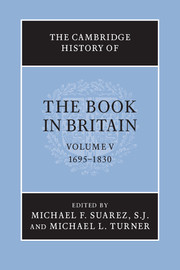Book contents
- Frontmatter
- Introduction
- PART I THE QUANTITY AND NATURE OF PRINTED MATTER
- PART II ECONOMIC, LEGAL AND CULTURAL CONTEXTS
- 3 The book as a commodity
- 4 Copyright, authors and censorship
- 5 The rise of the professional author?
- 6 Women and print: readers, writers and the market
- PART III THE TECHNOLOGIES AND AESTHETICS OF BOOK PRODUCTION
- PART IV THE BOOK TRADE AND ITS MARKETS
- V BOOKS AND THEIR READERS
- Abbreviations used in bibliography
- Bibliography
- Index
- Frontispiece
- Plate section
- References
4 - Copyright, authors and censorship
from PART II - ECONOMIC, LEGAL AND CULTURAL CONTEXTS
Published online by Cambridge University Press: 28 September 2010
- Frontmatter
- Introduction
- PART I THE QUANTITY AND NATURE OF PRINTED MATTER
- PART II ECONOMIC, LEGAL AND CULTURAL CONTEXTS
- 3 The book as a commodity
- 4 Copyright, authors and censorship
- 5 The rise of the professional author?
- 6 Women and print: readers, writers and the market
- PART III THE TECHNOLOGIES AND AESTHETICS OF BOOK PRODUCTION
- PART IV THE BOOK TRADE AND ITS MARKETS
- V BOOKS AND THEIR READERS
- Abbreviations used in bibliography
- Bibliography
- Index
- Frontispiece
- Plate section
- References
Summary
The Statute of Anne
In 1695 the Licensing Act expired. This Act, which was the lineal descendant of various printing ordinances and decrees dating back to the early sixteenth century, provided a comprehensive system for the examination and approval of materials to be printed. In addition, it confirmed the Stationers’ Company’s near monopoly on the British book trade and its powers to enforce its dominance. The lapse of licensing threw the book trade into disorder – members of the Company no longer were able to restrain others from printing their ‘copies’ – and led directly to the enactment in 1710 of the world’s first copyright statute, the Statute of Anne, and consequently to a fundamental change in the legal institutions within which the book trade operated.
Under the old system of Stationers’ Company regulation, a stationer who wished to publish would establish his right by entering the title as his ‘copy’ in the guild register. Once secured, a ‘copy’ continued forever and might be bequeathed, sold or split into shares, but only members of the guild – booksellers and printers, not authors – could own ‘copies’. When disputes over rights arose, they were generally settled within the confines of the guild. Publishing rights under the guild system were thus not quite property in the modern sense, even though stationers were accustomed to speaking of their ‘literary properties’. Rather, they were guild-conferred privileges that depended upon the company’s crown-chartered monopoly.
- Type
- Chapter
- Information
- The Cambridge History of the Book in Britain , pp. 118 - 131Publisher: Cambridge University PressPrint publication year: 2009
References
- 4
- Cited by

